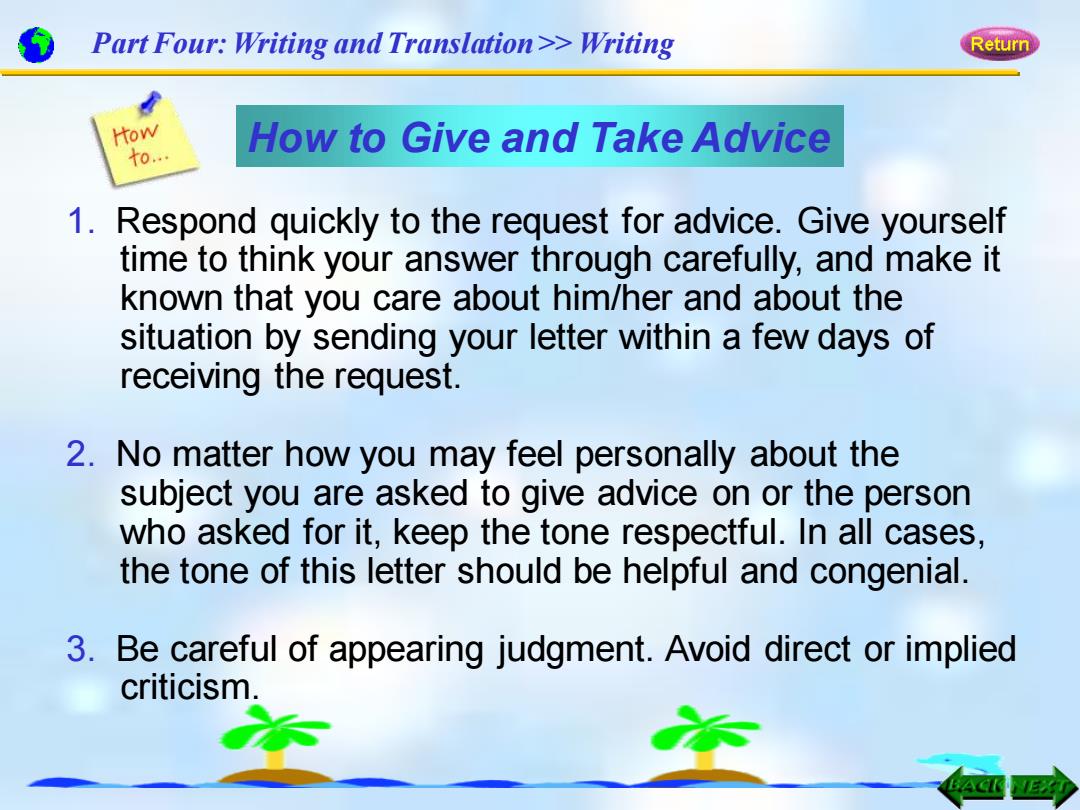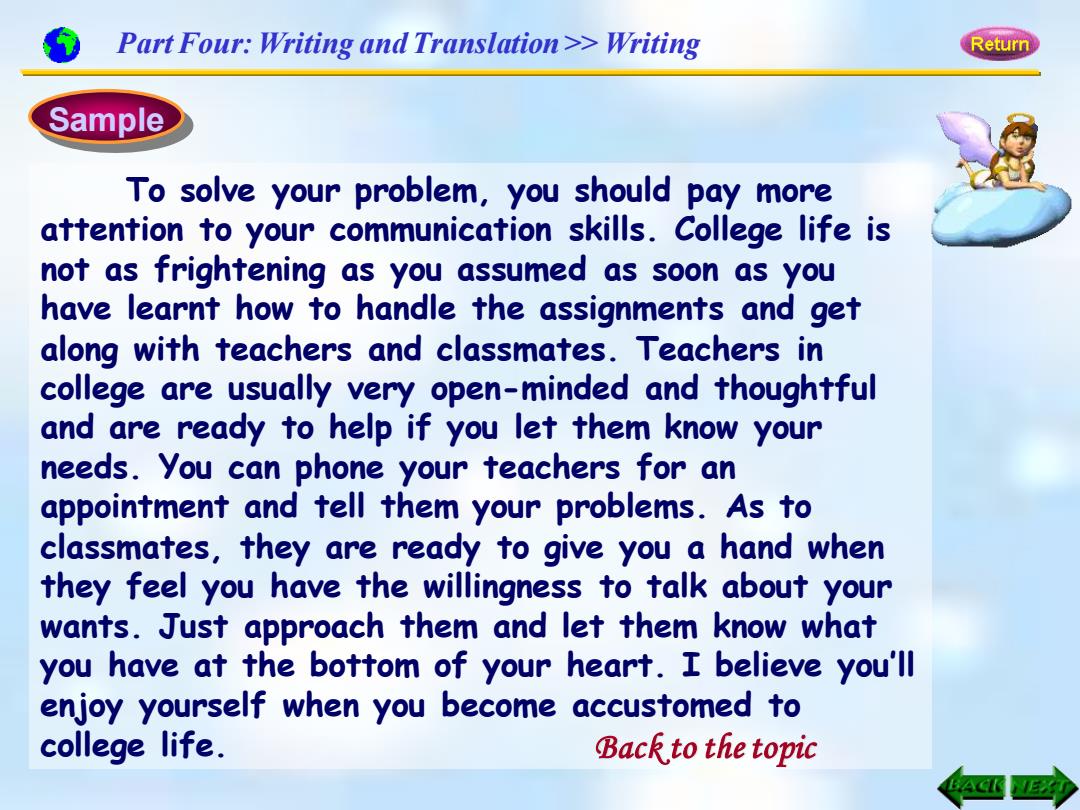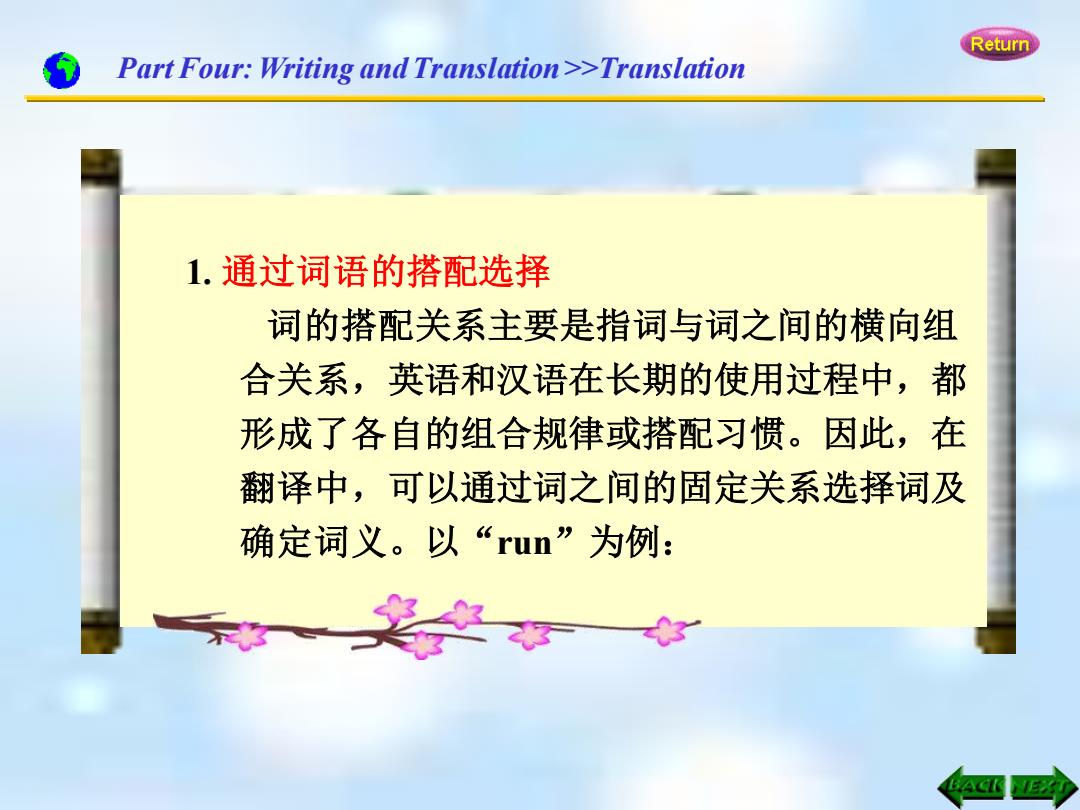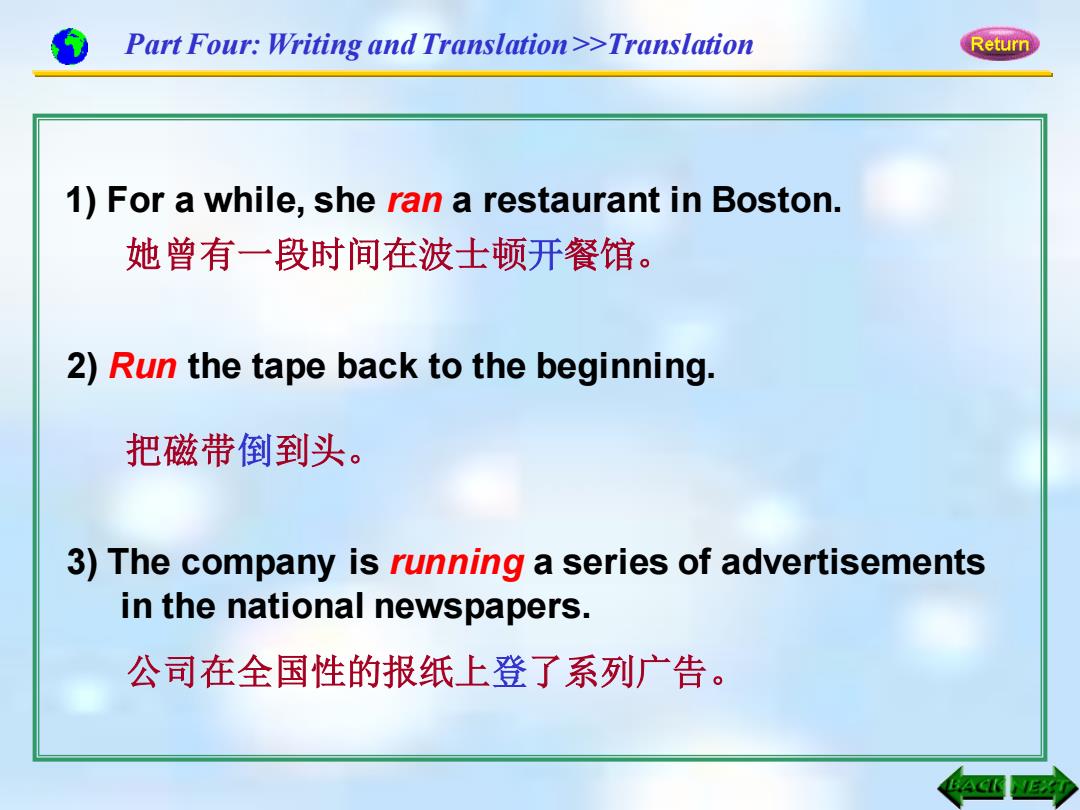
Part Four:Writing and Translation>>Writing Return How How to Give and Take Advice 0… 1. Respond quickly to the request for advice.Give yourself time to think your answer through carefully,and make it known that you care about him/her and about the situation by sending your letter within a few days of receiving the request. 2.No matter how you may feel personally about the subject you are asked to give advice on or the person who asked for it,keep the tone respectful.In all cases, the tone of this letter should be helpful and congenial. 3. Be careful of appearing judgment.Avoid direct or implied criticism
1. Respond quickly to the request for advice. Give yourself time to think your answer through carefully, and make it known that you care about him/her and about the situation by sending your letter within a few days of receiving the request. 2. No matter how you may feel personally about the subject you are asked to give advice on or the person who asked for it, keep the tone respectful. In all cases, the tone of this letter should be helpful and congenial. 3. Be careful of appearing judgment. Avoid direct or implied criticism. How to Give and Take Advice Part Four: Writing and Translation >> Writing

Part Four:Writing and Translation>>Writing Return 4.If you cannot give advice,express your regret,and suggest that someone else would be in a better position to do so.Avoid comments or expressions of personal opinion unless they are complimentary. 5.If the topic is a sensitive one,consider your approach carefully. 6.Avoid strong language that might discourage your reader. 7.Give advice only on the subject you have been asked about.Keep your advice simple and to the point. 8.Remember that personal advice should be given only when it is clear that someone has sincerely asked you for it.Even then it must be done with caution and sensitivity
4. If you cannot give advice, express your regret, and suggest that someone else would be in a better position to do so. Avoid comments or expressions of personal opinion unless they are complimentary. 5. If the topic is a sensitive one, consider your approach carefully. 6. Avoid strong language that might discourage your reader. 7. Give advice only on the subject you have been asked about. Keep your advice simple and to the point. 8. Remember that personal advice should be given only when it is clear that someone has sincerely asked you for it. Even then it must be done with caution and sensitivity. Part Four: Writing and Translation >> Writing

Part Four:Writing and Translation>>Writing Return 9.If someone takes your advice,maintain a tone of appreciation without any hint of condescension or feelings of superiority.Emphasize the reader's strengths,rather than the value of your advice. 10.When you are the one seeking advice,look to people you know you can rely on.They should be worthy of your trust and be willing to keep your request confidential. 11.When someone responds to your request for advice, whether you ultimately use the advice or not,it is always a good idea to write a thank-you letter or letter of appreciation
9. If someone takes your advice, maintain a tone of appreciation without any hint of condescension or feelings of superiority. Emphasize the reader's strengths, rather than the value of your advice. 10. When you are the one seeking advice, look to people you know you can rely on. They should be worthy of your trust and be willing to keep your request confidential. 11. When someone responds to your request for advice, whether you ultimately use the advice or not, it is always a good idea to write a thank-you letter or letter of appreciation. Part Four: Writing and Translation >> Writing

Return Part Four:Writing and Translation >Writing 12.If you use the advice or suggestion,give appropriate recognition.If you do not use it,you may wish to keep the advice letter at hand for future reference in case you change your mind
12. If you use the advice or suggestion, give appropriate recognition. If you do not use it, you may wish to keep the advice letter at hand for future reference in case you change your mind. Part Four: Writing and Translation >> Writing

Part Four:Writing and Translation>>Writing Return Writing Practice Read the following words from a freshman who is talking about a problem.Write an essay of 150 or so giving advice to him.Start with the sentence "To solve your problem,you should pay more attention to your communication skills." €%E
Writing Practice Read the following words from a freshman who is talking about a problem. Write an essay of 150 or so giving advice to him. Start with the sentence “To solve your problem, you should pay more attention to your communication skills.” Part Four: Writing and Translation >> Writing

Part Four:Writing and Translation>>Writing Return Writing Practice "When I got to the college,I was nervous.My roommates made me nervous;my classmates made me nervous;the sight of the teachers made me nervous;the classroom discussions made me nervous;everything made me nervous.” Sample BACK
Writing Practice “When I got to the college, I was nervous. My roommates made me nervous; my classmates made me nervous; the sight of the teachers made me nervous; the classroom discussions made me nervous; everything made me nervous.” Sample Part Four: Writing and Translation >> Writing

Part Four:Writing and Translation>>Writing Return Sample To solve your problem,you should pay more attention to your communication skills.College life is not as frightening as you assumed as soon as you have learnt how to handle the assignments and get along with teachers and classmates.Teachers in college are usually very open-minded and thoughtful and are ready to help if you let them know your needs.You can phone your teachers for an appointment and tell them your problems.As to classmates,they are ready to give you a hand when they feel you have the willingness to talk about your wants.Just approach them and let them know what you have at the bottom of your heart.I believe you'll enjoy yourself when you become accustomed to college life. Back to the topic
To solve your problem, you should pay more attention to your communication skills. College life is not as frightening as you assumed as soon as you have learnt how to handle the assignments and get along with teachers and classmates. Teachers in college are usually very open-minded and thoughtful and are ready to help if you let them know your needs. You can phone your teachers for an appointment and tell them your problems. As to classmates, they are ready to give you a hand when they feel you have the willingness to talk about your wants. Just approach them and let them know what you have at the bottom of your heart. I believe you’ll enjoy yourself when you become accustomed to college life. Sample Part Four: Writing and Translation >> Writing Back to the topic

Part Four:Writing and Translation >Translation Return Knowing About Translation 词是句子甚至整个语篇的基本构建单位,如何选 择恰当的词义,是翻译过程中首先要碰到的问题。只 有选择了恰当的词义,并在必要时加以恰如其分的引 词义的选择 申,才能确保译文的通顺。英语和汉语的词汇都非常 丰富,英语的一词多义,汉语的一字多义的现象十分 普遍。译者只有在掌握词典基本释义的基础上,根据 具体的语言环境和搭配习惯确定和选择词义,才能进 行不同的翻译搭配,并确定词义
词是句子甚至整个语篇的基本构建单位,如何选 择恰当的词义,是翻译过程中首先要碰到的问题。只 有选择了恰当的词义,并在必要时加以恰如其分的引 申,才能确保译文的通顺。英语和汉语的词汇都非常 丰富,英语的一词多义,汉语的一字多义的现象十分 普遍。译者只有在掌握词典基本释义的基础上,根据 具体的语言环境和搭配习惯确定和选择词义,才能进 行不同的翻译搭配,并确定词义。 词 义 的 选 择 Knowing About Translation Part Four: Writing and Translation >> Translation

Return Part Four:Writing and Translation >>Translation 1.通过词语的搭配选择 词的搭配关系主要是指词与词之间的横向组 合关系,英语和汉语在长期的使用过程中,都 形成了各自的组合规律或搭配习惯。因此,在 翻译中,可以通过词之间的固定关系选择词及 确定词义。以“run”为例: x3
1. 通过词语的搭配选择 词的搭配关系主要是指词与词之间的横向组 合关系,英语和汉语在长期的使用过程中,都 形成了各自的组合规律或搭配习惯。因此,在 翻译中,可以通过词之间的固定关系选择词及 确定词义。以“run”为例: Part Four: Writing and Translation >>Translation

Part Four:Writing and Translation>>Translation Return 1)For a while,she ran a restaurant in Boston. 她曾有一段时间在波士顿开餐馆。 2)Run the tape back to the beginning. 把磁带倒到头。 3)The company is running a series of advertisements in the national newspapers. 公司在全国性的报纸上登了系列广告
把磁带倒到头。 她曾有一段时间在波士顿开餐馆。 2) Run the tape back to the beginning. 3) The company is running a series of advertisements in the national newspapers. 公司在全国性的报纸上登了系列广告。 1) For a while, she ran a restaurant in Boston. Part Four: Writing and Translation >>Translation